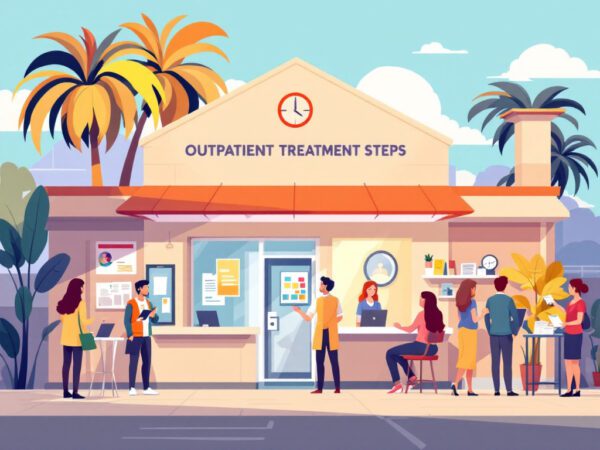Totality Treatment Overview
At Totality Treatment, we understand the significance of providing comprehensive and effective support for individuals facing drug and alcohol addiction. Our approach includes well-structured programs that cater to the diverse needs of our clients, ensuring that they receive the best care possible.
Comprehensive Drug and Alcohol Programs
Our comprehensive drug and alcohol programs are designed to address the multifaceted nature of addiction. Each program integrates various treatment modalities tailored to the unique circumstances of those we serve. We focus not just on the immediate issues but also on the underlying factors contributing to substance use.
Key components of our drug and alcohol programs include:
| Program Feature | Description |
|---|---|
| Individualized Therapy | Customized therapy sessions addressing personal experiences and emotions related to addiction. |
| Group Therapy | Supportive community meetings and peer interactions facilitate confidence and shared experiences. |
| Family Involvement | Educational sessions for families to help understand addiction and support their loved ones in recovery. |
Through these elements, we create an environment that supports both healing and personal growth.
Detoxification Services
Detoxification is often the first step in the recovery journey. Our medically supervised detox services ensure that clients can safely withdraw from substances in a supportive environment. This crucial phase focuses on managing withdrawal symptoms and ensuring overall safety.
Types of Detoxification Services:
| Type | Description |
|---|---|
| Drug Detox Placement | Specialized support for individuals overcoming various substance addictions. |
| Alcohol Detox Placement | Focused care for clients dealing with alcohol dependency to alleviate withdrawal symptoms. |
| Fentanyl Detox Placement | Targeted programs addressing the specific challenges of fentanyl addiction. |
| Benzo Detox Placement | Support for those dependent on benzodiazepines, ensuring safe withdrawal. |
Our detoxification services are conducted by trained professionals, ensuring that clients experience a secure and effective detox process. After detoxification, we offer ongoing support through our outpatient addiction treatment options, allowing our clients to continue their recovery in a structured manner.
At Totality Treatment, we are committed to providing the right support and guidance for you or your loved ones on the path to recovery. Whether through our intensive outpatient program or our various detox options, we are here to help every step of the way.
Importance of Structured Sober Living
Structured sober living plays a vital role in the recovery process for individuals facing substance use challenges. By creating a supportive environment, these residences can significantly impact recovery outcomes.
Role of Structured Sober Housing
Structured sober housing provides a drug- and alcohol-free living environment, essential for individuals aiming to maintain sobriety while undergoing outpatient treatment. This type of housing offers not only a safe space but also access to peer support, accountability, and resources necessary for recovery. Research indicates that individuals who chose to live in structured sober environments during outpatient treatment reported a greater likelihood of satisfactory discharge and longer stays in treatment programs (NCBI). This suggests that the structure and support provided by sober housing can enhance the effectiveness of addiction treatment programs.
Benefits of Structured Sober Living
The benefits of structured sober living are numerous, aiding individuals in their recovery journey. These include:
| Benefit | Description |
|---|---|
| Increased Accountability | Residents are held accountable for their actions and recovery processes, fostering a sense of responsibility. |
| Enhanced Recovery Support | Access to a community of peers who understand their challenges promotes mutual support and encouragement. |
| Skill Development | Structured living often incorporates life skills training, enabling residents to build essential skills for daily living. |
| Positive Recovery Outcomes | Research has shown that recovery housing is linked with higher rates of abstinence from substances and improved employment prospects. |
Individuals living in these environments benefit from structure, social and emotional support, and a network that fosters recovery (PubMed Central). Additionally, by addressing concrete housing needs, structured sober living can lead to better treatment outcomes and successful long-term recovery. This holistic approach ensures that individuals receive comprehensive support during their recovery journey. For more information on outpatient services, visit our pages on outpatient addiction treatment and intensive outpatient program.
Recovery Housing Support
In our journey towards recovery from addiction, having a solid support system is crucial. This is where recovery housing plays a pivotal role in fostering an environment that promotes healing and personal growth.
Peer Support in Recovery Residences
Peer support in recovery residences creates an atmosphere of camaraderie and mutual aid. Residents share similar struggles and experiences, fostering collective understanding and encouragement. Research shows that engaging in recovery housing leads to significant improvements in abstinence rates and stability in social and occupational roles. These living environments offer a safe and drug-free atmosphere essential for those recovering from substance use disorders. A study highlighted in PubMed Central confirms that peer support helps individuals build recovery capital, which encompasses the resources they need to navigate daily life effectively.
Furthermore, the structure and accountability inherent in sober living houses contribute positively to long-term recovery. Individuals residing in supportive settings reported better outcomes, including longer stays in outpatient treatments and an increased likelihood of achieving satisfactory discharges (PubMed Central). Sharing experiences and wisdom can motivate residents to stay committed to their recovery path while learning life skills that are invaluable for future success.
Positive Outcomes from Recovery Housing
The positive outcomes from recovery housing extend beyond individual recovery journeys. Residents frequently experience enhanced life skills development, increased employment opportunities, and reduced involvement with the criminal justice system. Research indicates that housing linked with treatment programs significantly influences substance use treatment outcomes. By addressing the concrete housing needs tied to recovery, these residences facilitate a smoother transition into everyday life.
In our experience, recovery housing is not merely about providing shelter; it embodies the essence of community and support. The structured nature of these programs allows residents to benefit from continuous engagement with recovery services and community organizations. This ongoing connection ensures individuals receive the support they need beyond the initial stages of treatment, promoting sustained recovery (NCBI).
| Outcome | Evidence |
|---|---|
| Abstinence rates | Higher in recovery housing |
| Employment gains | Direct correlation with peer support |
| Decreased criminal involvement | Linked with structured sober living environments |
Recovery housing thus provides a foundational support system that is integral to achieving lasting recovery. By fostering peer relationships and creating supportive environments, we ensure that individuals are not alone in their recovery journey. For more information on our outpatient programs and their benefits, please explore our other resources on outpatient addiction treatment and intensive outpatient programs.
Enhancing Recovery Outcomes
Choosing to engage with Totality Treatment’s programs can significantly boost recovery outcomes through two key areas: recovery capital building and life skills development.
Recovery Capital Building
Recovery capital refers to the resources and benefits that individuals can tap into for their recovery journey. This includes physical, social, human, and cultural resources that are crucial for effective daily life management. Recovery support services and structured sober living environments play a vital role in enhancing recovery capital, enabling individuals in outpatient treatment to stay engaged.
| Type of Recovery Capital | Description |
|---|---|
| Physical Resources | Access to housing, medical care, and transportation. |
| Social Resources | Supportive networks, including family, friends, and peers. |
| Human Resources | Skills, education, and employment opportunities. |
| Cultural Resources | Community connections, shared values, and cultural practices. |
Studies indicate that individuals opting for structured sober living during outpatient treatment experience increased service engagement and better treatment outcomes. Living in such environments is linked to a higher likelihood of satisfactory discharge and longer stays in treatment (NCBI).
Life Skills Development
Building effective life skills is essential for sustaining recovery. Structured sober living enhances the opportunity for individuals to practice and develop these skills in a supportive environment. Residents emphasize the importance of structure, accountability, and the practice of recovery skills during their stay in sober housing. This setup allows them to learn from peers and receive emotional support, which is crucial for their recovery journey (NCBI).
Life skills covered may include:
- Communication Skills: Effective interaction with others, crucial for building social networks.
- Problem-Solving Skills: Approaches to tackle everyday challenges without substances.
- Time Management: Prioritizing tasks and managing daily schedules to maintain a balanced lifestyle.
- Financial Management: Skills for budgeting and handling finances to ensure stability.
By participating in recovery support services and structured living, individuals can enhance their life skills, thereby improving their long-term recovery prospects. For more on outpatient options, visit our section on outpatient addiction treatment.
Community Integration and Support
Building a supportive community is vital for individuals recovering from substance use disorders. Community integration and support play a crucial role in reinforcing the recovery process, enabling individuals to thrive in their new sober lifestyles.
Neighborhood Integration
Neighborhood integration involves creating connections within the local community to provide a sense of belonging and support for individuals in recovery. Structured sober living environments facilitate this integration by promoting engagement with local resources, services, and social networks. Residents emphasize the importance of a safe and supportive living environment, which fosters accountability and encourages learning essential recovery skills (NCBI).
Being part of a community not only helps individuals maintain sobriety but also increases their access to employment opportunities, educational resources, and recreational activities. For many, living in a supportive neighborhood can lead to lasting relationships and a robust support system.
| Benefit of Neighborhood Integration | Description |
|---|---|
| Enhanced Social Support | Friendship and peer accountability encourage sobriety. |
| Access to Resources | Connection to local services provides additional support. |
| Opportunity for Engagement | Engaging in community activities fosters a sense of belonging. |
| Stability and Security | A safe environment promotes healthy living practices. |
Peer Support Networks
Peer support networks are a cornerstone of successful recovery housing. These networks provide individuals with the opportunity to share experiences and lean on each other for encouragement. Studies show that recovery housing can significantly enhance peer support, leading to better treatment outcomes (PubMed Central).
Living with peers who understand the challenges of recovery helps individuals practice life skills and gain social and emotional support. This type of environment has been linked to increased lengths of stay in outpatient treatment, greater satisfaction with discharge, and overall successful recovery experiences.
| Peer Support Network Benefits | Impact on Recovery |
|---|---|
| Increased Accountability | Encourages commitment to sobriety among group members. |
| Shared Experiences | Helps individuals realize they are not alone in their struggles. |
| Emotional Support | Provides comfort and guidance during challenging times. |
| Skill-Building Opportunities | Encourages the practice of life skills in a safe setting. |
Through community integration and robust peer support networks, individuals in recovery can build a solid foundation for lasting sobriety. Our housing referral outpatient programs recognize the importance of these elements in enhancing recovery outcomes and ensuring a successful transition into sober living.
Overcoming Treatment Challenges
Addressing the various challenges encountered during addiction treatment is crucial for a successful recovery journey. At Totality Treatment, we prioritize strategies that ensure our clients remain engaged and safe throughout their rehabilitation process.
Client Retention Strategies
Client retention in outpatient treatment is vital for successful long-term recovery. Research indicates that certain factors are associated with higher dropout rates, including marginalized status, lack of professional skills, and family history of substance abuse (NCBI Bookshelf). Addressing these issues is essential for maintaining commitment and minimizing attrition.
Some effective client retention strategies include:
| Strategy | Description |
|---|---|
| Personalized Engagement | Tailoring treatment plans to individual needs and circumstances encourages ongoing participation. |
| Group Cohesion | Fostering a sense of belonging among group members helps build support networks. |
| Consistent Group Membership | Reducing frequent changes in group composition helps clients feel secure and connected. |
| Professional Facilitation | Ensuring that group leaders have the requisite credentials can enhance the quality of therapy sessions. |
| Special Attention to High-Risk Clients | Monitoring clients with a history of severe mental disorders and preparing them for team dynamics is essential. |
Implementing these strategies can improve client engagement and lower dropout rates, leading to better recovery outcomes.
Addressing Safety Concerns
Safety remains a foundational aspect of any effective treatment program. For individuals in outpatient settings, especially high-risk clients, it is crucial that facilities address various safety concerns. Key considerations include:
| Safety Concern | Action |
|---|---|
| Monitoring Client Behavior | Regular observation helps identify potential issues before they escalate. |
| Intervention Planning | Have a clear action plan in place for problematic situations involving threats or violence. |
| Drug Presence | Actively manage the facility environment to prevent the influence of drug dealers or gang members. |
| Client Privacy | Protect the confidentiality and safety of clients to promote a secure treatment atmosphere. |
In outpatient treatment, safety measures must encompass not only the physical environment but also the emotional well-being of clients. By carefully monitoring surroundings and addressing threats like domestic violence or substance use within client families, we create a safe space conducive to recovery.
Through our tailored outpatient addiction treatment programs, such as the intensive outpatient program and partial hospitalization program, we strive to help individuals navigate the recovery process while maintaining their safety and well-being.















